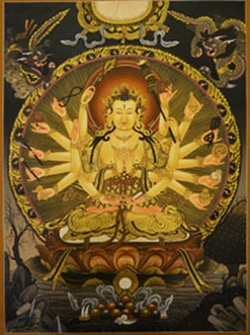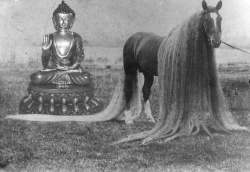The Perception Collection
The Padma family involves the Perceptions Collection. Perceptions represent the first awareness of the qualities of any object, person, or situation.
The best way to recognize what perceptions are is to notice what happens the first time we see an object. If we write down the first 5 things that we notice about the object, a ball for instance, we will get a sense of how perceptions work.
We may notice its roundness first, or its size, whether large or small, we might then notice its colour, or the material that it's made of. It might appear hard or soft, smooth or rough. We would need to then approach it and pick it up and feel the hardness or softness of the ball to confirm our impressions.
When we notice the roundness of the ball, the first thing that we need to do is unite with the ball's roundness. That is the Padma energy. The Ratna energy is then used to determine the degree of roundness, and Vajra energy then categorizes it, as an oval or as a rubber ball for instance. Next when we look at its size, we have to unite with its largeness. Then again we feel the degree and categorize it based on its largeness.
If the ball is blue, we have to unite with its blueness. We do all of this by enveloping its roundness, largeness, or blueness with our minds. Then we go from there to the degrees of Ratna energy and the categorization and definitions of the Vajra Family. We do the same with the ball's hardness as well.
If we are shown a smaller ball right after the larger one, we will tend to notice the size of the second ball before all other qualities. This comes about simply because of the fact that we've see a large ball first.
The same works with people and situations. We may get the impression that someone is sad and so, with our minds at first, we envelop their minds, then we may verbalize or act on our impression and thus make a connection.
So this is how perception operates. We see a quality of an object, person, or situation (blueness or sadness), and then we move towards the object and unite with that quality to learn more about it and confirm our impressions. This demonstrates how we have a perception of a quality, which leads to a curiousity to learn more, which then leads to a desire to unite with the object (person, or situation) and learn more about it and confirm our impression. All of these tendencies are part of the expression and manifestations of Padma energy.
This is the same energy as the fire element energy of attraction and consumption. The degree of attraction is similar to the heat of the fire. The object, person, or situation is consumed based on the degree of the intensity of the attraction, just as a flammable object is consumed based on the degree of heat of the fire.
It is also interesting to note that different people will perceive these qualities in a different order or with different preferences. Someone might pick out the colour first, or the size. In real life situations, a lot of these selections are karmic; the result of our current habitual tendencies.
As an example of this is, if we are feeling superior, we will tend to notice qualities in others that make them appear inferior to us. Similarly, if we are angry, we tend to notice, first, the things that are irritating. If we are concerned with personal advancement, the first things that we will notice are what or who can help us the most and what needs to be said or done in this situation to advance our own cause. A good example of this is when we were all smokers. The first things that we looked for when we entered any room was the location of the ashtrays, lighters, or if there were any no smoking signs.
If we're in love, we tend to notice the things that we like about the person and can be dismissive or completely blind to any of their faults. If we view others as our teachers, then we will tend to notice their wisdom or the things that they can teach us. If we view people with gratitude for being our benefactors, then we will tend to notice, first, ways in which we can repay them.
If we get used to viewing things as impermanent, and unable to provide us lasting satisfaction, then we tend not to perceive these objects, persons, or situations, as objects that we can cling to. This changes the whole way that we relate to those objects.
These are all examples of how our current mind-state can influence our perceptions. Through mindfulness, we can become aware of when our perceptions are being influenced by harmful mind-states or beneficial mind-states.
Through the process of mindfulness of perceptions, we can notice how quickly we move from perception which is Padma energy, through feelings which is Ratna energy, and on to categorizing and organizing the results of our impressions which is part of Vajra energy. We also learn just how much our perceptions depend upon our awareness, mind-states, goals, and values which belong to the Buddha and Karma energies.
Through this, we come to know just how important right view or complete view is in the way that we deal with the world. When we see the trouble we can get into because of perceptions that differ from the actual reality, or perceptions that differ too much from the perceptions of those around us, then we recognize the importance of realistic perceptions and a more complete view of the world around us.
Also, the way in which things are presented to us will also change our perception of them. A lot of our "consumer" society is based on creating a desirable image of a product or person, in order to entice others to buy the product or service, or support a particular person or idea. Unfortunately, often people are willing to be immoral in order to entice others to get what THEY want. The result is that we have to work through a high degree of deception and exagerrated or false images to arrive at the true picture. This is the result of unchecked greed and ignorance of the value of honesty and the importance of our unity with others. The end result is frustration and disunity and further deception.
Many problems have resulted from this greed and this impulse to consumption. In the process, countries have invaded other countries and continents and divided them up like dividing the spoils. Africa is a good example, but it also happened in the middle east and asia as well during the "exploration" done by the British, French, Spanish, and Dutch. With little regard for the customs and natural boundaries of the peoples and continents they were "exploring", they went about consuming and dividing up the land and resources.
All of this came from a perception of entitlement. These countries felt that they were civilized, "modern", sophisticated, and superior. Invaded areas were thought of as uncivilized, backward, primitive, and inferior. This allowed them to feel justified in taking what they wanted and ignoring the needs and well-being of those they invaded.
We are currently living with the results of these activities that happened several hundred years ago. We are also continuing to operate by these same notions. Like anything else, we have to acknowledge that mistakes are being made and were made out of greed and ignorance and then set out to rectify those mistakes.
We also need to recognize that the desires and well-being of others is as important as our own well-being. If we harm the well-being of others for our own sakes, then we eventually end up having to deal with the misery that we have left in our wake. We eventually have to deal with the poverty and crime, anger, and bitterness and pollution and scarcity that results from ignoring our interconnections. If we begin to convince everyone that satisfying our own desires at the expense of others is not beneficial for us either, then we can put an end to exploitation that creates the types of situations that we see around the world at this time.
In order for this to happen, we need to change our perception of others from being people to exploit, take advantage of, or get something from, to viewing people as our equals, equally deserving happiness and the same benefits as ourselves.
By regarding worldly situations as impermanent, unable to satisfy, interdependent and selfless, then the way that we connect to the world totally changes. Our level of greed will be diminished and we will place more importance on our relationship with others than on obtaining the objects of our desires.
We can view others as coniving, scheming, ruthless competition that we need to exploit, take advantage of and fight against. This creates a world of deception, lying, fighting and fear and paranoia. And others will treat us in the same way, so that we cannot trust, know the truth, be at peace, be unafraid or be confident. We could begin to view those who ARE coniving, scheming, and competitive as ignorant, spoiled and immature children who don't know any better. We could also view others as our Benefactors, Companions, Teachers, and as our responsibility. How we perceive others and then relate to and categorize them would be totally different because of that. From this would come cooperation, truthfulness, sharing, peacefulness and confidence. The choice of which way we want to live is up to us.




